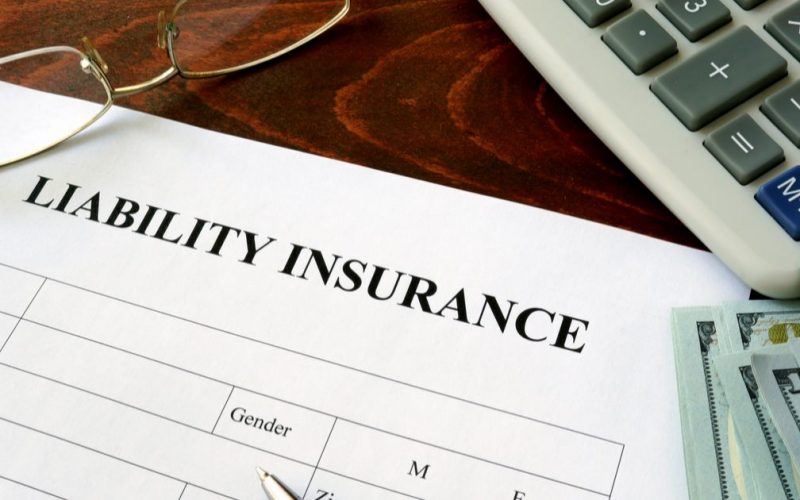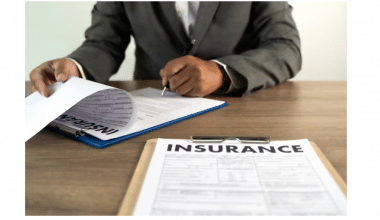What is general liability insurance? This is a common question among business owners. And they want to know if they need it, not simply what it is. The truth is that liability insurance is a necessary component of every insurance plan. General liability insurance (GLI) can help cover claims that your company was responsible for physical harm or property damage. This is also referred to as commercial general liability insurance (CGL). GLI can be purchased as a stand-alone policy or bundled with other important coverages as part of a Business Owner’s Policy (BOP). We’re here to assist you in determining what liability insurance coverage your company may require. We’re also here to assist you to understand the meaning of general liability insurance or acquire a general liability insurance quote.
What Is Liability Insurance?
The phrase liability insurance refers to an insurance product that protects an insured party from claims resulting from injuries and also property damage to others. Also, liability insurance policies cover any legal fees and settlements incurred if an insured party is proven legally accountable. In general, liability insurance coverage does not cover intentional harm or contractual liabilities. Liability insurance policies, unlike other types of insurance, pay third parties rather than policyholders.
The Basics of Liability Insurance
Liability insurance is essential for those who are liable and at fault for the injuries suffered by others, or if the insured person destroys someone else’s property. As a result, liability insurance is frequently referred to as third-party insurance. Even if the insured party is proven legally accountable, liability insurance does not cover willful or illegal activities. Everybody who operates a business drives a car, practices medicine or law—basically anyone who can be sued for damages and/or injuries—purchases a policy. Policies protect both the insured and other parties who may be harmed due to the policyholder’s inadvertent fault.
Third-party insurance is another name for liability insurance.
Most states, for example, require car owners to obtain liability insurance as part of their auto insurance plans to cover injury to other people and property in the event of an accident. A product maker may obtain product liability insurance to protect themselves in the event that a product is defective and causes harm to the purchasers or another third party. Business owners can obtain liability insurance to protect themselves if an employee is injured while conducting business. Liability insurance plans are also required for judgments made by doctors and surgeons while on the job.
Read Also: Health Insurance for Business Owners and Employees
Personal liability insurance policies are typically purchased by high-net-worth individuals (HNWIs) or those with substantial assets, but this type of coverage is recommended for anyone whose net worth exceeds the combined coverage limits of other personal insurance policies, such as home and auto insurance. Although most carriers provide discounted rates for bundled coverage packages, the expense of an additional insurance policy may not appeal to everyone. Personal liability insurance is considered a supplementary policy, and also, policyholders may be required to carry specific amounts on their home and auto policies, which may result in additional costs.
The United States is the largest market for business liability insurance, according to the Insurance Information Institute. In 2014, for example, there were $86.6 billion in liability claims filed across the country, followed by $10.6 billion in the United Kingdom. In the previous two decades, there has been a lot of activity in the global liability insurance industry. According to Statista, the market reached $3.3 billion in 2017, the highest level since 1994.
Particular Considerations
Although business general liability insurance covers the majority of legal issues, it does not protect directors and officers from being sued, nor does it protect the insured from errors and omissions. Companies must have special policies in place for certain situations, which include:
Errors and Omissions Liability Insurance (E&O)
An errors and omissions liability insurance policy protects against lawsuits stemming from negligent professional services or failure to perform professional duties. This type of insurance should be purchased by lawyers, accountants, architects, engineers, and also, any other business that provides a service to a client for a price. Criminal prosecution, fraudulent or dishonest activities or physical injury claims are not covered by E&O coverage. However, the insured is protected for legal expenses, court costs, and settlements up to the amount indicated in the insurance contract. (tramadol)
Directors and Officers (D&O) Insurance
This type of policy protects large corporations’ directors and officers from legal judgments and costs resulting from illegal acts, erroneous investment decisions, failure to maintain the property, releasing confidential information, hiring and firing decisions, conflicts of interest, gross negligence, and other errors. Most D&O policies do not cover fraud or other criminal conduct. Premiums are determined by the company, its location, industry type, and loss history.
Types of Liability Insurance
Business owners are vulnerable to a variety of liabilities, any of which might expose their assets to significant claims. All business owners must have an asset protection strategy in place that is based on available liability insurance coverage.
The following are the most common types of liability insurance:
- Employer’s liability and workers’ compensation are required coverages for employers that protect the company from liabilities originating from employee injury or death.
- Product liability insurance is designed for enterprises that make things for general sale. Product liability insurance shields companies against claims resulting from injuries or deaths caused by their products.
- Indemnity insurance protects a company from negligence claims resulting in financial harm as a result of mistakes or failure to perform.
- Director and officer liability insurance protects a firm’s board of directors or officials against legal liability if the company is sued. Even though firms normally give some level of personal safety to their employees, some organizations provide additional protection to their management team.
- Personal liability plans designed to safeguard against catastrophic losses are known as umbrella liability policies. When the liability limits of other insurance are reached, coverage normally kicks in.
- A basic commercial general liability policy, often known as comprehensive general liability insurance, is business liability insurance. It provides insurance coverage for lawsuits stemming from employee and public injury, property damage caused by an employee, and injuries sustained as a result of an employee’s careless activity. Intellectual property infringement, slander, libel, contractual liability, tenant liability, and employment practices liability may also be covered by the policy.
Read Also: Commercial General Liability Insurance CGL US: Policy, Coverage and Costs
- Comprehensive general liability plans can be tailored to any size or type of business, partnership or joint venture, corporation or association, organization, or recently acquired enterprise. Bodily injury, property damage, personal and advertising injury, medical costs, and premises and operations liability are all covered by insurance. Insurers cover compensatory and general damages but not punitive damages in litigation.
Who requires Liability Insurance?
Each company is unique, but you want to make sure you’re protected. General liability insurance is used by the following companies:
- Contractors with artisanal skills
- Owners of small businesses
- Landscape design firms
- IT consultants
- Agents of real estate
- Consulting
- Marketing
- Cleaning services
- and much more
What Is the Definition of General Liability Insurance?
General liability insurance (GLI), also known as business liability insurance and commercial general liability insurance, protects your company from physical injury and property damage claims. These types of disputes might arise in the course of typical corporate activities. You’d have to pay for damages out of pocket if you didn’t have coverage.
What Is Covered by General Liability Insurance?
General liability insurance covers the price of responding to a claim that your company caused property damage or bodily harm. It can be used to assist pay for:
- Medical expenditures incurred by a customer or client as a result of a slip and fall in your establishment
- Repair expenses for repairing a wall that your employee inadvertently damaged while working at a customer’s house
- Legal fees for defending your company in a lawsuit
- Settlements and judgments obtained as a result of a lawsuit filed by a customer or client
- General liability insurance can assist cover the following claims:
- Bodily harm or property damage caused by your business.
- Reputational harm caused by malicious prosecution, defamation, libel, unlawful eviction, invasion of privacy, and other actions.
- Advertising injuries, such as copyright infringement from your company’s advertisements.
- Medical expenses if a customer or client is injured while visiting your establishment.
- Renter’s property damage caused by a covered loss such as fire, lightning, or explosion.
What Is the Cost of General Liability Insurance?
The cost of your general liability insurance is determined by various factors.
One consideration is the nature of your business. Companies in higher-risk industries pay more than lower-risk businesses. Construction companies, for example, are likely to be charged a greater cost than consultancy firms. Other factors that can influence the cost of your general liability insurance include your company’s:
- Years of expertise
- Location\s
- Size
- Policy specifics, like as coverage limitations and deductibles
- History of insurance claims
Obtaining a quotation is the best approach to determine the cost of your commercial general liability insurance. You can customize your coverage to meet your individual requirements.
Why do you need General Liability Insurance?
As a small company owner, you may be held legally liable if another person is injured or their property is harmed while visiting your establishment or as a result of anything you did. Ascertain that your company is adequately risk-protected.
Consider purchasing general liability insurance if you or your employees:
#1. Face-to-face interactions with clients
When you visit a client’s workplace or clients visit yours, there is always the risk that someone will be injured and require medical attention.
#2. Have access to the customer’s belongings
If a customer’s property is damaged at your place of business or on a project site, general liability insurance may cover the expense of repairing or replacing it.
#3. Use advertising to promote your business.
If you market your business and inadvertently utilize copyright or trademarked language, general liability insurance may cover you if a claim is made.
#4. For business-related activity, that use third-party locations.
If someone (other than you or your employee) gets hurt on a job site for which you are liable, general liability insurance may cover their medical expenses.
#5. Coverage is required in order to be considered for a project.
If you propose or bid on specific contracts, liability insurance may be required as a condition of contract award.
Is General Liability Business Insurance required by Law?
Generally, state laws do not force business owners to carry general liability insurance. However, having this coverage is still a good idea. If a consumer sues your company and you don’t have coverage, it might jeopardize both your company’s finances and your personal assets.
It’s critical to understand your state’s insurance regulations. Work with a local insurance agent or our specialist small company insurance team to make the best choices for business liability insurance.
Related: NFL Pension: The Ultimate Guide in 2021 (Updated)
Professional and Limited Liability Insurance
You can increase your company’s liability coverage by purchasing limited liability insurance and professional liability insurance.
The formation of a limited liability corporation (LLC) separates your personal assets from those of your business. However, you are still vulnerable to liability claims, which might put your company’s finances in danger. A limited liability insurance coverage can help to safeguard your LLC by covering claims that your company caused physical harm or property damage.
Professional liability insurance coverage protects your company in the event that you are sued for a mistake in the professional services you supplied. This is also referred to as errors and omissions (E&O) insurance.
Is Liability Insurance Required for Independent Contractors?
As a 1099 contractor, you must have adequate insurance coverage. You can be sued just like any other small business owner, and liability claims can be quite costly. If you don’t have insurance and a client or customer sues you, you’ll have to pay the fees out of your own money. And that can be enough to force you to close your doors.
That is why we provide independent contractor liability insurance, a sort of general liability insurance (GLI). This coverage can assist in protecting your company from certain liability issues.
Read Also: GENERAL CONTRACTOR: Definition, Licencing and Salary (Updated!)
What is the scope of Contractors General Liability Insurance?
General liability insurance for independent contractors, sometimes known as 1099 insurance, can help cover claims such as:
- Property damage or bodily injury caused by your firm.
- Damage to one’s reputation as a result of malicious prosecution, slander, libel, and other actions.
- Copyright infringement in your advertising might cause advertising injury.
Who Is Required to Have 1099 Contractor Liability Insurance?
So, when do you require liability insurance? To fill up your protection, it’s a good idea to obtain different types of liability insurance coverage. Additional types of insurance that can assist protect you and your company include:
- Contractors working on their own
- Plumbers
- Carpenters
- Contractors in electrical work
- Painters
- Contractors for repairs
- Carpet and house cleaners
- Editors and authors working as freelancers
- Designers of graphics
- Salon experts and independent hair stylists
- Trainers for horses or dogs
How Can 1099 Contractors Obtain General Liability Insurance?
There are two options for obtaining general liability insurance:
Your customer can add you as an additional insured to their general liability insurance policy. This protects you while you work, but it may be more expensive for your clients.
From an insurance company: Obtaining your own insurance is usually the most cost-effective solution for your consumers. When you receive your policy, request a certificate of liability insurance as confirmation of coverage.
What Other Insurance Does an Independent Contractor Require?
It’s a smart idea to supplement your protection with different types of insurance. Additional types of insurance that can assist protect you and your company include:
- If you use your vehicle for work, you must have commercial auto insurance. This might assist coverage in covering damages if you are involved in an accident while driving for work.
- Workers’ compensation insurance is required if you have employees or consider yourself to be an employee of your company. Employees who suffer a work-related injury or illness are eligible for benefits under this plan.
- Errors and omissions insurance might help protect you against allegations that you provided poor professional services. This is sometimes referred to as professional liability insurance.
- Business income insurance, which assists in recouping lost income if you are unable to open due to a covered loss.
- Commercial property insurance can help protect the tools and equipment you use at work, whether you own them or rent them.
What is the Procedure for obtaining Proof of General Liability Insurance?
It can take a day to several weeks for traditional insurance agencies to deliver a certificate of general liability insurance to new customers. This can be problematic for a business owner who needs rapid evidence of insurance in order to sign a pending contract.
What If My Company Requires Greater Liability Coverage?
If your company faces significant risks or revenue, you can supplement your general liability insurance with commercial umbrella insurance. Umbrella insurance raises your policy’s maximum policy limit, allowing your insurer to pay more expensive disputes.
Your company most likely confronts potential risks that exceed the limits of general liability insurance. You can combine these policies with general liability to receive the coverage you require:
- Commercial property insurance protects your company’s assets. A business owner’s policy is what it’s called when it’s combined with a commercial general liability insurance (BOP). It’s also frequently available at a discount.
- Cyber liability insurance covers you in the event of a cyberattack or a data breach. It’s a critical policy for companies that handle credit cards and other sensitive client information.
- Product liability insurance can assist pay for lawsuits if a product you created or sold injures or damages a customer’s property.
- Hired and non-owned auto insurance (HNOA) protects automobiles that your company uses but does not own. (Commercial auto insurance can be obtained separately to protect your company’s vehicles.)
- Liquor liability insurance guards against the hazards of serving alcohol. It is frequently required for obtaining a liquor license.
What’s the Distinction between General Liability Insurance and Professional Liability Insurance?
Customer injuries, customer property damage, and advertising injuries are all covered under general liability. Professional liability insurance protects you in the event of a dispute over the quality of your professional services.
Almost every firm needs general liability insurance. However, firms that provide professional services require additional safeguards against errors and dissatisfied customers.
This is where professional liability insurance comes into play. This coverage protects professionals such as accountants and auditors, lawyers, consultants, and insurance agents from high-priced litigation based on the quality of their work.
How can Commercial General Liability Insurance Safeguard My Company?
Legal expenditures from ordinary third-party litigation can be covered by general liability insurance. Here are a few examples of common scenarios in which general liability insurance protects home enterprises, contractors, and small businesses.
| Home business | Contractor | Small business | |
| Liability protection | You may need general liability to pay for a lawsuit from a courier who slips on your icy doorstep while delivering documents. | A client may ask you to provide a certificate of insurance in case you damage their equipment. | You sign a commercial lease and your landlord requires general liability insurance. |
| Advertising injury protection | You launch a website and want protection against accidental copyright infringement. | So, you want protection in case someone involved with a project accuses you of libel or slander. | You launch your first advertising campaign and want protection against advertising injury lawsuits. |
Get the best Liability Insurance for your needs.
General liability insurance does not cover everything. General liability insurance, for example, will not protect you against allegations of negligence, even if it is not your or your company’s fault. Some people get additional business liability insurance in addition to general liability.
Does liability insurance cover injuries to employees?
Liability insurance typically does not cover injuries to employees, which are typically covered under workers’ compensation insurance.
How do I file a liability insurance claim?
A liability insurance claim can be filed by contacting the insurance company and providing the necessary information and documentation.
What happens if I am sued and I don’t have liability insurance?
If a business is sued and doesn’t have liability insurance, it will have to cover the cost of legal fees and any settlements or judgments out of its own assets.
Can I cancel my liability insurance policy if I no longer need it?
Yes, liability insurance policies can be canceled at any time, although there may be a cancellation fee.
How does liability insurance affect my premium?
Liability insurance premiums are typically based on factors such as the type and size of business, the industry, and the amount of coverage requested.
What is an umbrella liability insurance policy?
An umbrella liability insurance policy provides additional liability coverage over and above existing insurance policies.
Liability Insurance FAQs
What is an example of liability insurance?
Property damage liability coverage helps pay for repairs if you cause an accident that destroys someone else’s property (such as their automobile). For example, if you rear-end another vehicle, this coverage can assist you to avoid having to pay for the other driver’s vehicle repair out of pocket.
What is the difference between liability insurance and full coverage insurance?
There is a significant distinction between liability insurance and full coverage. Liability insurance protects you from accidents you cause, but complete coverage protects you in other ways as well. If you own your automobile outright, you can choose the coverage limits that are appropriate for you and your family.
Will my insurance pay if it was my fault?
If you reside in a fault state, the individual who caused the accident will be held liable for any injuries sustained. The other driver would make a claim with your insurance provider, and you or your auto insurance would cover the damages. However, in a no-fault jurisdiction, each party’s auto insurance normally compensates for their losses.
Does liability cover stolen?
No, liability insurance covers another party’s personal injury and/or property damage as a result of an accident caused by you. It usually does not cover car theft. Comprehensive insurance is required if you want coverage for automobile theft.
{
“@context”: “https://schema.org”,
“@type”: “FAQPage”,
“mainEntity”: [
{
“@type”: “Question”,
“name”: “What is an example of liability insurance?”,
“acceptedAnswer”: {
“@type”: “Answer”,
“text”: “
Property damage liability coverage helps pay for repairs if you cause an accident that destroys someone else’s property (such as their automobile). For example, if you rear-end another vehicle, this coverage can assist you to avoid having to pay for the other driver’s vehicle repair out of pocket.
“
}
}
, {
“@type”: “Question”,
“name”: “What is the difference between liability insurance and full coverage insurance?”,
“acceptedAnswer”: {
“@type”: “Answer”,
“text”: “
There is a significant distinction between liability insurance and full coverage. Liability insurance protects you from accidents you cause, but complete coverage protects you in other ways as well. If you own your automobile outright, you can choose the coverage limits that are appropriate for you and your family.
“
}
}
, {
“@type”: “Question”,
“name”: “Will my insurance pay if it was my fault?”,
“acceptedAnswer”: {
“@type”: “Answer”,
“text”: “
If you reside in a fault state, the individual who caused the accident will be held liable for any injuries sustained. The other driver would make a claim with your insurance provider, and you or your auto insurance would cover the damages. However, in a no-fault jurisdiction, each party’s auto insurance normally compensates for their losses.
“
}
}
, {
“@type”: “Question”,
“name”: “Does liability cover stolen?”,
“acceptedAnswer”: {
“@type”: “Answer”,
“text”: “
No, liability insurance covers another party’s personal injury and/or property damage as a result of an accident caused by you. It usually does not cover car theft. Comprehensive insurance is required if you want coverage for automobile theft.
“
}
}
]
}
Related Articles
- General Liability Insurance Policy: For Businesses
- Business Liability Insurance: Definition, Costs, Coverage & Cost-Effective Options
- GENERAL CONTRACTOR: Definition, Licencing and Salary (Updated!)
- PUBLIC LIABILITY INSURANCE COVER: What Does Public Liability Insurance Cover?
- GENERAL LIABILITY INSURANCE: Coverage and Quotes for Your Business
- BEST UMBRELLA INSURANCE: 2022 Best Umbrella Insurance Options






